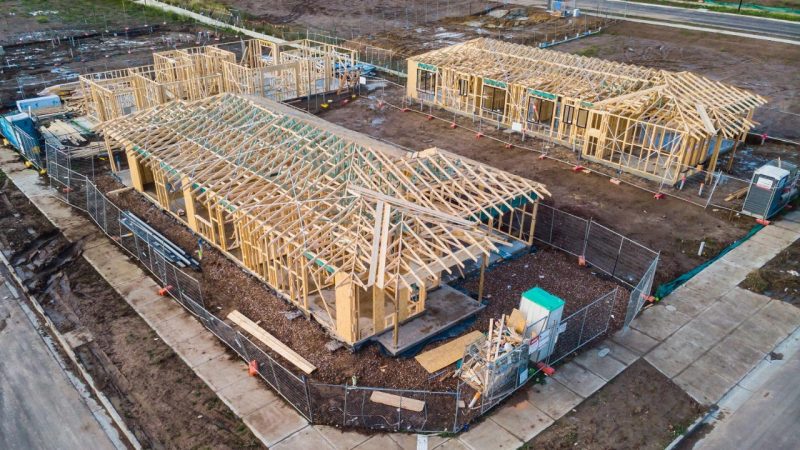- A surge in new construction and renovations, along with supply chain disruptions and material shortages, has resulted in an extraordinary rise in construction prices
- CoreLogic’s quarterly gauge of home building costs shows a nationwide increase of 3.8 per cent in the three months to September 2021
- According to the Cordell Building Cost Index (CCCI) this is the greatest quarterly rise since the third quarter of 2000 when construction costs jumped 7.2 per cent
- The annual CCCI gain in the nation was 7.1 per cent, the greatest yearly growth rate since March 2005
- The increase in building expenses comes at a time when CoreLogic reports a 20.3 per cent increase in national house prices over the last year
A boom in new buildings and renovations, along with supply chain interruptions and material shortages, has resulted in an unprecedented increase in construction prices.
CoreLogic’s quarterly gauge of home building costs shows a nationwide increase of 3.8 per cent in the three months to September 2021, exceeding the Consumer Price Index’s (CPI) 0.8 per cent growth over the same time.
According to the Cordell Building Cost Index (CCCI) this is the greatest quarterly rise since the third quarter of 2000 when construction costs jumped 7.2 per cent following the implementation of the GST.
The annual CCCI gain in Australia was 7.1 per cent, the greatest yearly growth rate since March 2005.
The increase in building expenses comes at a time when CoreLogic reports a 20.3 per cent increase in national house prices over the last year. Higher building costs are anticipated to exacerbate the affordability issues that already exist in the current housing market.
Tim Lawless, Research Director at CoreLogic, stated that the rise in housing approvals, which peaked in March, was now proceeding to construction, generating widespread demand for supplies and services.
This increased construction activity coincided with a disruption in supply lines, putting further strain on the building sector, which was already grappling with a severe scarcity of supplies.
“The quarterly rate of growth in construction costs is happening everywhere and is not restricted to one city or state, it’s a national trend,” he said.
“There was a much bigger increase in our index when the GST was introduced, however outside of that structural adjustment this is by far the biggest quarterly change on record. This would be the largest market driven increase we’ve seen.
“For anyone who is looking to build or to renovate, or for someone who owns a business involved in the residential construction industry, it means they are all likely to be facing significantly higher costs.”
The Cordell costings team has seen persistent pricing volatility in the Australian market, with quarterly price increases driven mostly by rising timber prices, particularly structural timber, metal items, and plumbing supplies.
Following the implementation of the HomeBuilder Grant in June of last year, and a following record-breaking spike in house approvals that peaked in March, Australian housing commencements increased by more than 50 per cent year-on-year to June.
Although the pipeline of new home supply is currently reducing, with total dwelling approvals trending lower since March, the record number of permitted dwellings will take some time to shift to completion.
According to Mr Lawless, Australia is in the midst of a prolonged phase of increased residential construction activity, which will have a big influence on developers, builders, and consumers.
“This doesn’t look like a short-term spike, the surge in construction costs is due to the amount of construction activity that’s been approved at a time when we can’t import more skilled labour and are facing significant supply chain disruptions,” he said.
“This construction cost inflation could continue for another 12 to 18 months. It’s unlikely the industry can absorb a cost increase this significant into their margins and higher construction costs will ultimately be passed on to the consumer, placing further upwards pressure on the price of a new dwelling or renovation.”

